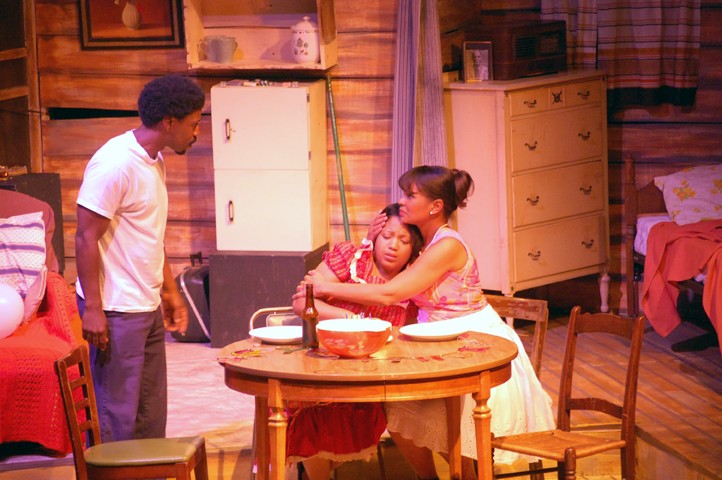
Ekundayo Bandele, Krissi Cain, and Bronzjuan Worthy
By all rights, Hattiloo Theatre’s founding executive Ekundayo
Bandele should make a fantastic Stanley Kowalski in Tennessee Williams’
A Streetcar Named Desire. He’s got a look that fluctuates
between easygoing elegance and smoldering intensity. His performance in
Topdog/Underdog was a highlight of the 2007/’08 theater season,
proving that the gifted writer, designer, and director can come out
from behind the curtain and hold his own as an actor. But for some
reason, Bandele never seems completely at home in the skin of Williams’
brutish masculine archetype. And his performance, while always
watchable, is surprisingly mundane. The same may be said for the rest
of an ensemble that gives until it hurts but still comes up short.
There are times when I think of Williams as the Yngwie Malmsteen of
American playwrights. Like the quick-fingered guitar player, Williams
was given to a bit of excess. And all possible lessons from
Amadeus aside, even the greatest artists can play too many
notes. I agree with critic Brooks Atkinson, who, in 1947, described
A Streetcar Named Desire as overlong, explaining that “not all
those words are essential.”
Although he’s associated with naturalistic Method actors such as
Marlon Brando, Williams was a formalist’s formalist and his
self-consciously poetic words with their expressionist overtones and
echoes of Shakespeare and Chekhov were never intended to be
“essential.” They were supposed to be a beautiful assault on the
audience’s senses, capturing every sweaty, grimy nuance of life in New
Orleans’ French Quarter. They were supposed to play out like jazz, and
when an ensemble really cooks, that’s exactly how it works. But not
every ensemble can jam. There’s not always a lot of natural chemistry
between the principle characters at Hattiloo, and without that
chemistry, this overheated melodrama about sex, money, power, and the
crumbling aristocracy of the Old South can drag on. Without that
natural chemistry, the words can pile up like a wreck on the
interstate, bringing any forward progress to a crawl.
A show where most of the racist language targets people of Polish
descent and where much of the drama keys off of the loss of a family
plantation can be a jarring test for an African-American theater
company. It’s a test Hattiloo ultimately passes as a result of their
honest, unfussy performances. Still, there’s a little something lost in
the translation.
Krissi Cain makes for a sweet Stella, though it’s hard to know why
she doesn’t run when Stanley turns violent. The “things” she speaks of
that happen between a man and a woman making everything else okay are
seldom evident.
Bronzjuan Worthy gets all of Blanche’s nervous fragility but very
little of her edge. The character may be wounded and delusional, but
she’s also a master manipulator of both women and men. She’s a
proto-cougar who’s always depended on her wits, not the “kindness of
strangers.” Even in the end, as she’s being taken to a mental hospital,
that famous line is a part of her act. Worthy’s performance is detailed
and often compelling. But only in the scene where Blanche considers
seducing a newspaper boy are we allowed to see her more reptilian and
predatory side emerge.
Delvyn Brown seems to understand that beneath his character’s
mama’s-boy exterior lurks the heart of a wolf. Oh sure, he’s the most
polite guy on poker night, but he still tries to push his date with
Blanche as far as it will go. Unfortunately, of all the major
characters, his seems to be the most interesting and the least fully
developed.
Director Leslie “Stickey” Reddick has crafted a solid if not always
exciting production of one of the 20th century’s most deceptively
difficult scripts. Light changes can be abrupt and jarring, and the
voices from the street never mingle as smoothly as the Dixieland
Williams attempted to mimic. Still, there is virtue in simplicity, and
even if the play is never as dynamic as it could be, it’s refreshing to
see A Streetcar Named Desire presented free from so much
of the baggage that usually accompanies it.
Of all of Tennessee Williams’ best-known scripts, Streetcar
may have aged the worst, but even Hattiloo’s uneven production will
remind audiences why this show changed the face of American
theater.